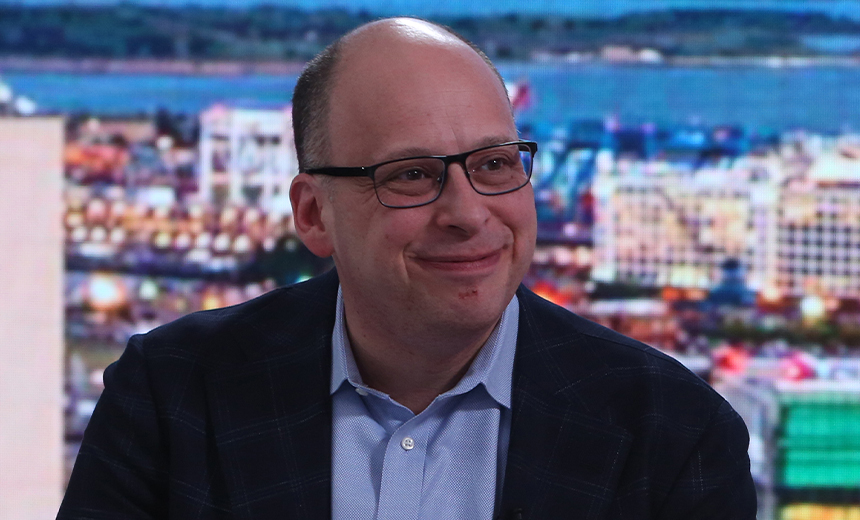Events
,
Next-Generation Technologies & Secure Development
,
RSA Conference
Money Aims to Simplify Fundraising for RSA Conference Innovation Sandbox Finalists

The private equity firm that owns RSA Conference will invest $5 million into each of the 10 finalists competing to be named most innovative startup.
See Also: The Operationalization of Threat Intelligence Programs
Crosspoint Capital said the money will deliver immediate financial runway to promising startups, helping them capitalize on exposure from the Innovation Sandbox contest without getting bogged down by fundraising. Managing Partner Hugh Thompson said Crosspoint’s investment – which is a prerequisite for participating – is designed for simplicity and flexibility and doesn’t put restrictive conditions on startups.
“Five million dollars is not massive compared to the size of rounds that these folks raise afterwards, but what it does do is it gives them a runway to capture all of the benefit that they get when they show up at RSA conference,” Thompson told Information Security Media Group. “We felt that this was a way for them to instantly apply capital to capture opportunity that they’re going to get out of RSA Conference.”
Why Do High-Flying Cyber Startups Need Another $5M?
Past Innovation Sandbox finalists have gone on to be key players in the cybersecurity solutions space. Past finalists include Phantom Cyber, 2016 winner; Axonius, 2019 winner; Securiti AI, 2020 winner; Wiz, 2021 finalist; Pangea, 2023 finalist; and Reality Defender, 2024 winner.
Finalists often experienced significant fundraising success post-contest, but Thompson said the time and focus lost to fundraising was a potential bottleneck for these startups during a critical growth phase. He said the $5 million from Crosspoint will serve as a stepping stone, helping startups sustain operations and capture opportunities generated by their exposure at RSA Conference (see: Why the Cybersecurity Industry Needs to Be Agile).
“The companies themselves get a lot of benefit from being on the stage, getting the exposure of being in the top 10,” Thompson said. “And then we looked back at where these companies typically are in their funding journey if they made it into the top 10 in the first place, and we wanted to design something that it would be so easy for them to accept into their funding.”
The $5 million will help startups better handle heightened interest from prospective buyers, design partners and other stakeholders, and give them money to invest in product development, customer acquisition and hiring, Thompson said. The funding will allow companies to make key hires and meet the demands of new design partnerships, particularly with large, resource-intensive clients, Thompson said.
“For those companies that need the runway and need the capital infusion to capture the attention that they’re getting, following up on leads, making changes to the product roadmap to try and accommodate some of these new opportunities and partners, I think it could be significant for those folks,” Thompson said. “I’m excited to see how they use it and how it gets deployed, and what they do with it afterwards.”
The funding is structured as an uncapped SAFE note, which eliminates the need for immediate valuation discussions, reduces administrative burden and creates flexibility for both founders and future investors. The uncapped SAFE note doesn’t create any debt obligations and has only two stipulations: quarterly business updates and the right for Crosspoint to keep its initial level of ownership during future funding.
“It doesn’t force them into any kind of valuation discussion,” Thompson said. “The beauty of that SAFE is it says, ‘Let us wait, and when you actually do your next professional financing, we are going to accept the value that happens at that point.'”
Diluting Concerns About Founder Dilution
The investment’s design minimizes potential concerns about dilution and doesn’t place any restrictions on future fundraising, according to Thompson. He said startups retain full control over their valuation and are free to engage with other investors – including direct rivals of Crosspoint – without conflict. The investment from Crosspoint complement existing venture capital relationships startups have, he said.
“No dilution happens until they raise the next round,” Thompson said. “What they’re likely to do is use the $5 million, get customers, secure those customers, get recurring revenue, and then leverage that to increase the size of whatever next round that they would get.”
Thompson said startups that make it to the top 10 of the Innovation Sandbox competition will be better resourced to deliver on their potential, enhancing the overall quality and reliability of solutions entering the market. The financial support also positions startups to navigate the procurement process with extra confidence, thereby accelerating technology adoption in enterprise environments, Thompson said.
“You live off of innovation,” he said. “If you’re a chief security officer, it has to happen. It happens oftentimes through some of these very young companies, and then often those companies get acquired into platforms, and you may ingest it better from the platforms. But financial services companies and government entities, they’re going to want to get it straight from those startups as soon as possible.”
Engaging with early-stage startups will strengthen Crosspoint’s position in the cybersecurity ecosystem, and Thompson said the firm intends to complement venture capital initiatives and not compete against them. While Crosspoint operates primarily in the private equity space, he said investing in Innovation Sandbox finalists reflects its willingness to engage earlier in the company lifecycle to nurture innovation.
“We’ve got a pretty good history – even though Crosspoint is a young firm – of investing together with others,” Thompson said. “We’ll continue to build relationships with these companies and help them in ways that we can, as we do for all of our investments. But this is literally the most light investment you could make in something.”
